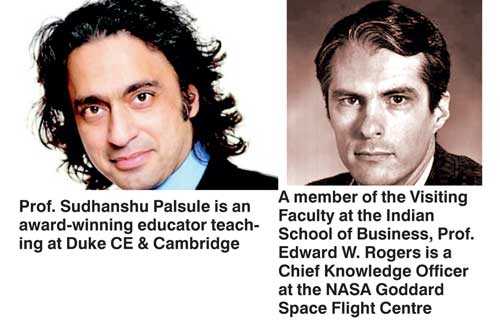Monday Feb 23, 2026
Monday Feb 23, 2026
Tuesday, 5 June 2018 00:00 - - {{hitsCtrl.values.hits}}
According to Professor Sudhanshu Palsule, for many leaders the question is no longer whether we will be disrupted, but how quickly can we adapt to constant disruption?
With disruptive business models and complex technologies, leaders are tasked with leading in chaotic and complex world.
Complexity increasingly defines the business landscape. It is the opposite of linearity and happens when unforeseeable factors converge together to create a situation that is not only unpredictable but immune to the traditional rules of decision-making. It is where command and control leadership just does not work anymore.
Four dominant forces are reshaping our organisations and societies in the 21st century and creating massive shifts in the way we work and lead. Globalisation, digital technology, socially created information and a new demographic are forcing organisations and industries to rethink their strategies for succeeding in a complex global world in which information is becoming a commodity and leadership can no longer be fully reliant on hierarchy.
Prof. Palsule explains complexity by the following characteristics.
Self-organising - It consists of a number of diverse agents, and each of those agents makes decisions on how to behave irrespective of organisations or individuals.
Adaptive - The diverse agents are continually interacting with each other, thereby becoming highly adaptive.
Emergent - The system as a whole becomes unpredictable as a result of the interactions which no one can control.
In a nutshell, complexity is the absence of data points and information that we traditionally rely upon to make decisions. It does not mean that there is no information. There may be weak signals that are hard to pick up as long as we are stuck in the mindset that we traditionally rely upon.
We are moving into an age of globally connected networks where continuous disruption is the norm, where information is increasingly produced and consumed through social media, and where agility replaces every other parameter of success.
How can leaders emerge successful in an unpredictable, rapidly changing and complex world? Do they need to think differently, behave differently or do they need to have a different a mindset?
The answer would be all of the above. It is vital for the leaders to nurture the capacity to be adaptive and shed their baggage in order to become more mindful, decisive and capable of rapid innovation. Leaders need to develop mindfulness.
Leaders need to work towards building mindfulness so that they can sense and actualise emerging possibilities that would otherwise be inaccessible.
The leader’s state of mind becomes the vital link in addressing a complex situation, accessing a field in which decisions are made without complete information and action happens effortlessly.
If you wish to learn more about leading in complexity and aspire to rewire your mindset to become a mindful leader, register for the Advanced Management Program(AMP) conducted by PwC’s Academy.
The program is designed specifically for CEOs and Business Leaders in Sri Lanka & South East Asian regions. AMP aims to drive the participants towards developing a better sense of judgement to lead in an uncertain and complex business world, provide them with new lenses and perspectives to make sharper decisions, adapt better and, most importantly, be mindful as a leader.
Professor Edward Rogers, along with Professor Sudhanshu Palsule, will be conducting a unique session on ‘Leading in Complexity and Mindful Leadership’ during the first week of the program.
Participants would go through the Columbia Shuttle Simulation, which was designed by NASA to train astronauts to lead in complex and uncertain environments.
Meet the Faculty
Prof. Edward Rogers received a B.S. in Agronomy from the Ohio State University, a Master’s in International Business from the University of South Carolina, and a Ph.D. from Cornell’s School of Industrial and Labour Relations in Human Resource Management and Organisational Behaviour. Prof. Rogers is a frequent guest lecturer in MBA classes and at Federal Agencies in Washington, D.C. Since 2009, he has been a visiting faculty member at the Indian School of Business where he teaches a popular course on managing complexity. Prof. Rogers has served as the Chief Knowledge Officer at the NASA Goddard Space Flight Centre in Greenbelt Maryland since joining NASA in 2003. At Goddard, he has built a set of knowledge management practices that strategically support the Centre’s overall mission of designing, developing and flying space missions and continuously improving space communications.
Prof. Sudhanshu Palsule is an award-winning educator, consultant and leadership coach, regarded as one of the leading thinkers in the field of Transformative Leadership. He teaches at Duke CE and Cambridge. His globally run leadership workshops are renowned for their transformative impact.
Prof. Palsule’s work on leadership is a unique combination of three decades of the exploration of human cognition and behaviour and the new research emerging from neurology and psychology, coupled with his training in quantum physics. His clients include several Fortune 500 companies such as Rolls Royce, BMW, PepsiCo, Accenture, Deloitte, Ericsson, Barclays Bank and Unilever. He works with the top management teams, assisting them in creating breakthroughs in their way of thinking and operating. He has written several books including “The Social Leader”, “Managing in Four Worlds”, “Personal Growth”, “The Ecology of Organisations”, and “The Power of Purpose”.
Register with the Advanced Management Program and rewire your mindset to become a mindful leader. This 21-day residential program will be scheduled across three cohorts as follows:
Week One: 16 to 22 July - Heritance Ahungalla
Week Two: 16 to 22 October – Heritance Negombo
Week Three: 03 to 09 November - Heritance Ahungalla